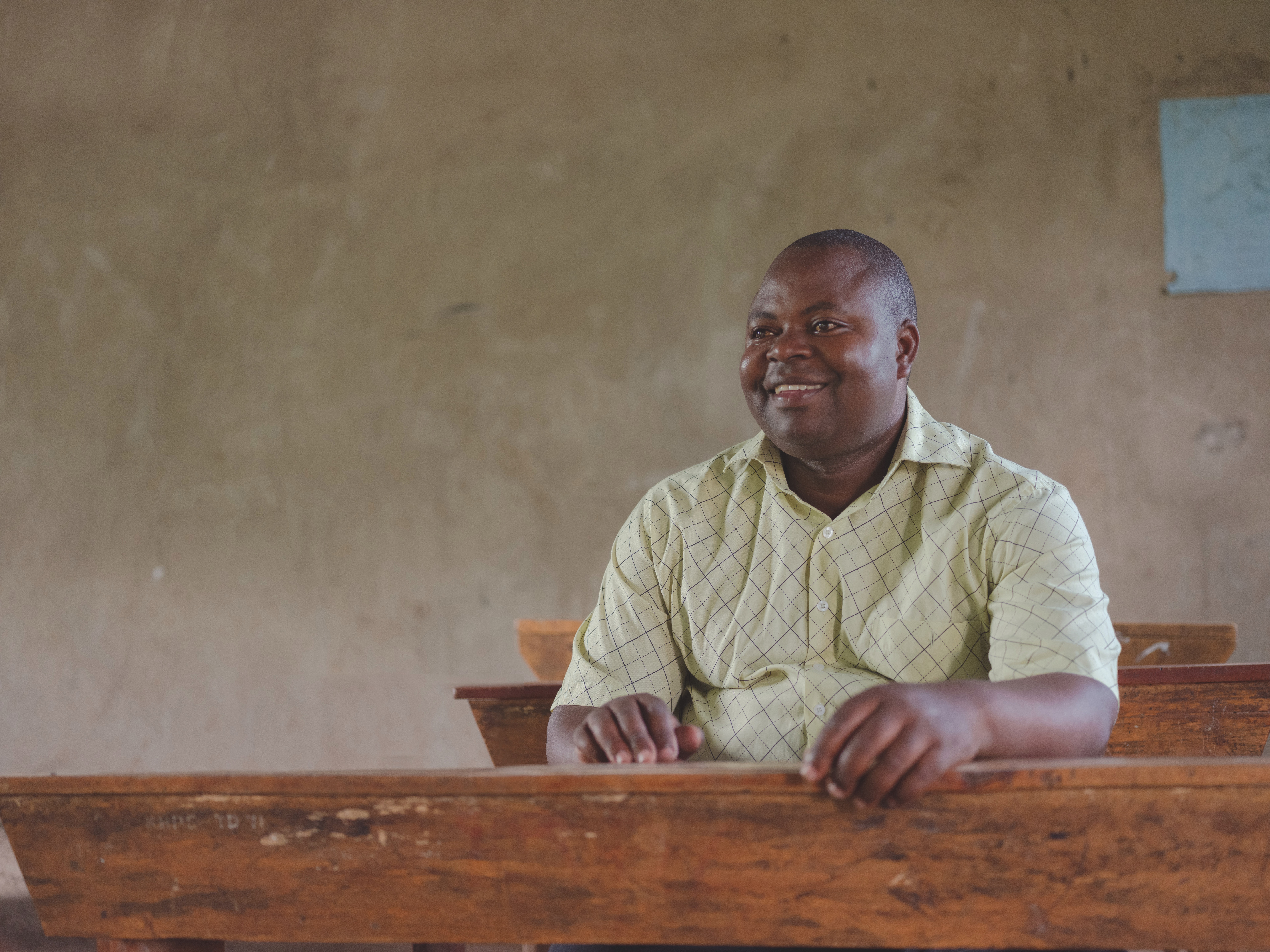Uganda, a country of over 40 million people in East Africa, is a nation of believers. In a 2010 Pew Research Center survey, 77 percent of Ugandan respondents said they were absolutely certain that God exists, and 82 percent said they attended a religious service at least weekly. Only three percent said they did not believe at all. Meanwhile, Bwambale Robert Musubaho and his colleagues are running a network of schools that encourage children to think critically and to do good — with or without faith. It’s part of a small but growing atheistic humanist movement in the country, one that aims to challenge religious orthodoxy and fundamentalism. Musubaho spoke with Ruby Pratka.
Ruby Pratka: What led to establishing the Kasese Humanist School?
You may unsubscribe from any of our newsletters at any time.
Bwambale Robert Musubaho: In 2009, I created a community-based organization to disseminate humanism in my part of the country. We decided to create a library, but because Uganda doesn’t have a strong reading culture, I realized that the library wasn’t working. We discussed trying to create a school instead. Then, we created the Kasese Humanist Primary School. As a younger organization, we didn’t have resources. So I appealed to the international community. The first organization that I worked with was Atheist Alliance International, which sent volunteers to develop fundraising strategies. From there, we looked for students, met with parents and advertised. The school opened in 2011 with 87 children and eight teachers. We now have 850 students in three nursery schools, three elementary schools and one secondary school. We also have an orphanage with 14 children on full board and 112 children on a day-scholar program.
RP: How do you explain humanism to people who are unfamiliar with it?
BRM: I try to promote humanism through good works. Also, I’ve always told parents that our school is not there to indoctrinate children, but to expose them to critical thinking. I even encourage the parents to go through books on secularism in our library so they know what I’m doing. I’m trying to encourage people to know more about their own beliefs and not to put all their trust in one book. I’m also encouraging them to study other religions.
More on Broadview: Attracting the spiritual but not religious through ‘un-churching’
RP: Is humanism big in Uganda?
BRM: It’s still small. It’s a mixture of several organizations that promote secular views, but each does so in a different way. Some are promoting it in the form of schools, others work on environmental projects, advocate for human rights or establish orphanages. Overall, we’re trying to tell people that being non-religious doesn’t mean that you can’t do good things. And we are trying to tell the world we are not Satanists; we are just advocating for good morals in society.
RP: Are the teachers atheists?
BRM: No, they are religious. They are from government-run teachers’ colleges. We teach the normal government curriculum, and then we add humanist topics, such as critical thinking, professional skills training and computer classes. These are probably the things that make our schools different. We even hold workshops to allow our teachers to discover secular literature.
RP: Why is this kind of education important in Uganda?
BRM: Religion has caused a lot of problems. We had the Holy Spirit Movement [a precursor of the Lord’s Resistance Army, which was responsible for widespread death and displacement in the 1990s]. We had people who died in Kanungu [a mass suicide of about 1,000 members of a Christian fundamentalist cult in 2000]. Today, you still find corrupt politicians who have been given front-row seats in church, and they are trying to pretend they are good people when actually they are bad.
A lot of religions here in Uganda are business-oriented — someone is setting up a church to attract crowds so he maybe gets money. Each religion is looking for ways they can attract crowds. We have seen pastors clashing with each other, pastors smearing others because they have big congregations. And people are being manipulated. Those pastors are just trying to fool people.
“I know the good side of religions — they can promote unity and love. But I also know the bad side. ”
RP: But religion can be a force for good as well — how do you support children who do profess a faith in your schools?
BRM: We are not trying to tell children to shun places of worship. They are free to go there. Even at our school, we teach religious education. But we analyze the books the people believe in and we apply critical thinking for these books. We identify when they were published, by whom and what the motives were. In Uganda, a religious person is not allowed to be shown such things.
RP: Can’t someone be faithful and a critical thinker? What if a student asked lots of questions and thought critically, but then decided they believed in God?
BRM: If a student realizes, using his or her own brain, that being religious is the best way, then there is not much we can do about that. I know the good side of religions — they can promote unity and love. But I also know the bad side.
RP: We hear a lot about American evangelical groups funding schools and orphanages in Uganda. Do you see them as competition?
BRM: They are very well-organized because they have a lot of money and other resources. I don’t have the same resources, but the existence of the internet is simplifying the work of promoting secularism in the world. People can research their own beliefs, and also research evangelicals to learn who they are and where they come from.
RP: What are your goals for the future?
BRM: My wish is that my schools continue to grow so they can serve more people. I’m also encouraging some of my friends who have chosen to go secular to create other projects like mine so that more people will understand that being non-religious doesn’t mean that you are taking people to hell. I don’t believe in heaven or hell, but I do know that at some point I will die, so I want to keep doing good work in this world.
This interview has been edited and condensed for clarity. It was originally featured in Broadview’s October 2019 edition with the title “Humanism in Uganda.” To read more of Broadview’s award-winning content, subscribe to the magazine today.













Humanism is considered a broad topic. I’m assuming the author is considering Christian Humanism during the interview, but it’s much bigger than that.
Humanism has two fronts against it. First atheism doesn’t like it, because there is a moral and self value to it. A philosophy which borrows from the Judaeo-Christian thought, which asserts all persons need to behave ethically without a scientific standpoint or reason. It also makes assumptions of the future (What we do today – will it affect the future negatively or positively? Take the Industrial Revolution as an example)
Secondly, the Judaeo-Christian faith doesn’t like humanism, because it treats “mankind” as self sufficient and we don’t need a “higher power” to tell us how to live, we can do it on our own. (History has disproved this concept from the beginning of time).
Anyone who has been a Missionary in Africa can tell you that Christianity was spread quickly through the continent without ensuring a solid biblical foundation within the Spiritual leadership. It is only now that they are playing “Catch-up” and have established Biblical solid seminaries for the nationals. (Oddly, some of these nationals are coming here to share their faith.) Unfortunately some nations have succumbed to false teachings, and others have succumbed to extreme Islamic teachings.
The interviewee states “religion” rather than faith groups, so it is hard to see whether there is an issue within the Christian faith itself: say – Catholic, Pentecostals and Methodists or if it is with faith groups such as Judaism, Christianity and Islam.
My thought – is what he is doing any different than our public schools in North America? I doubt it.
I have noticed in reading Broadview a subtle disdain for anything evangelical. Of course you don’t directly attack evangelicals. You are much more subversive than this. The church that is not evangelical, that is to say one that is not proclaiming the good news of Christ’s saving love, is a dying church. Because it is not our church. It is Christ’s. There are three primary pillars on which the Christian Church is balanced: Worship of God revealed in Christ, sacrificial service in the way of Christ and proclaiming Christ as the good news for all people. We the UCC formally gave up on the third pillar decades ago. This man you interviewed is simply following us into the minefield of “progressivism” we are walking. How about some articles on the failure of how and why secular humanism has failed humanity massively in the 20th century.
Good for you, Broadview, for publishing Ruby Pratka’s portrayal of the good work happening in Uganda. To paraphrase a well-known author (Greta Vosper), it is important to know how to be just and loving toward one’s neighbour on this earth, without doing it because you’re afraid of hell, or working hard to get stars on your crown.